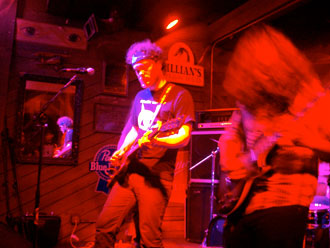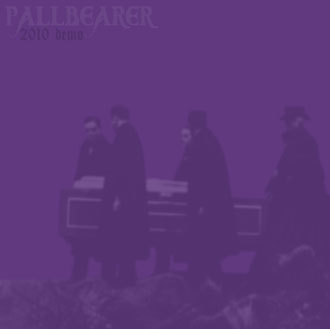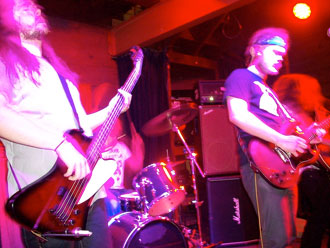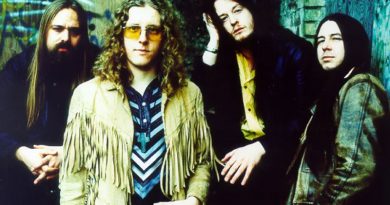Pallbearer Interview
True doom… I am being honest when I say that I rarely make a mess of my pants over it. Apart from the classics it rarely gets a “look in” at my listening rotation, so rest assured when I do make a mess of my pants then it has to be good.
Pallbearer come from Arkansas, USA and play true doom with flair and conviction and stand out from the hordes.
As the great Doomlord says “Nuff said!”
How did Pallbearer form? Did it involve the disintegration of any other bands? And if so, was anything carried from a previous band and into Pallbearer…
[JR] Brett and I have been playing music together literally since the day we met years back. We met while we were in college and jammed and things have just fallen into place since then. We have had an ongoing project called SPORTS since 2005, which is an improvised heavy and psychedelic drone project, but we had always been secretly working on these little side projects when timed permitted. Pallbearer was an idea that sort of gestated over the period of a few years, and then finally came about in late 2008. We all love true doom and wanted to create some ourselves.
[BC] SPORTS had gotten to a point where it was difficult to play, because we played with something like fourteen heads and all the cabs that naturally go along with that. Hauling that shit around and having to set up just got to be a chore after a while, especially considering there’s an extremely limited audience in Arkansas for that sort of music. Setting up a literal ton of gear and playing to an audience of five got to be kind of depressing after a while, so we decided to work on a project where we could play through less gear, so if we played and three people saw it, we wouldn’t have the extra kick in the ass of having to deal with so much equipment… And like Joe said, we’ve always loved doom and it was natural to move into that context. Arkansas has a pretty strong doom community, with some truly incredible bands, but most of them have harsh vocals and kind of a sludgy feel–not that that’s a bad thing–but we thought that we could bring something different to our area by embracing more of a traditional sound while retaining some of the psychedelic aspect of SPORTS. Also, we were both going through very dark times for different reasons, and Pallbearer provided the perfect outlet and sort of catharsis for feelings of despair and hopelessness. After writing a few songs and getting a better idea of how we wanted to approach our songwriting, we realized we needed another guitarist. We had been friends with Devin from the local music scene, and had been fans of his previous bands, so we asked him to join and luckily he did. It worked out really well in that regard, though we’ve had a revolving door of drummers.
With the very well received demo under your belt and what are your plans for the new recordings?
[BC] We recorded about 85% of the upcoming full length on analog tape, until we ran out of tracks, and finished up the last bits and pieces on ProTools. The process has been a long one, due to our combined schedules and perpetual brokenness, but we’re very close to being done… It’ll have the first two songs from the demo and three newer ones. I think people will enjoy the new songs; they were written after we’d gotten more comfortable with what we perceived our sound to be, so they’re a bit more mature in structure and complexity, while still being focused on visceral impact.
[JR] The full length is definitely miles beyond the demo in my opinion. We spent quite a bit of time crafting every aspect of it rather than rushing it out, so we hope that’s reflected in the finished product. We also have some new material in the works for splits and other limited releases. Not sure when those things will surface, but they’re definitely brewing.
During the recording of the album the decision to exclude “Gloomy Sunday” from the demo was made? Is there any particular reason? For me it was one of the best songs on the demo, it just invoked a very real sense of hopelessness.
[BC] Actually we never planned on including “Gloomy Sunday” on the full length, as we wanted our debut to feature all original material. I agree with you, there is a huge sense of hopelessness within that song, which is why we had to cover it. There may be a possibility that we’ll re-record it sometime in the future, but it’s not very likely. We intended the song to be exclusive to the demo.
[JR] At this point, we would like to move on with new material rather than continuing to re-visit past stuff. Who knows though, we may change our minds at some point.

Why did you choose Chuck Schaaf (Rwake) as an engineer?
[JR] We’ve known Chuck for a while now, and his current band Deadbird is one of our collective favorites. Chuck approached us about recording and we jumped at the chance. The experience doing the record with him has been phenomenal and we’re looking forward to doing it again in the future.
[BC] I’ve been a huge fan of all the bands he’s been involved in, he has an analog tape machine, he knows his shit when it comes to tone, and is a true brother in metal! What more reasons would anyone need?
As with a lot of bands who play a similar style, the key to the good sound is very dependent on tone. What defines good tone to you? What gear do you guys use?
[JR] I could probably talk about this forever, but I’ll try to keep it kind of short. We’re total tone hounds. For me it’s all about Acoustic amps. I have been collecting them for a few years now and the tone is hard to top in my opinion, at least for what we’re doing. What I use live and in studio is my bass dual-amped into an Acoustic 270 and Acoustic 370. The 270 runs an Ampeg 8×10 and the 370 an Acoustic 408 (4×15). With the right EQ settings, the tone is pure vintage crush. As for basses, I’ve been switching them around a bit lately due to some technical problems. My favorite is my ’91 Fender P-Bass, but it’s been out of commission for quite some time unfortunately. I also have a Kramer DMZ5000 aluminium neck and Epiphone Thunderbird bass that I bought for a backup.
[BC] I run my Gibson SG through my fuzz and delay pedals and split the signal into two heads. I switch heads around occasionally, depending on what is working at the time, but lately I’ve been using one of the brown Acoustic G120 heads through an 80s era Peavey 4×12 with the mids cranked and a Carvin MTS3200 through a Sunn Fender reissue 4×12 with a more crunchy sound. I’ve found that running two (or more) heads creates a fuller and heavier tone than using just one. I also just recently picked up an HH amplifier similar to the ones that Pink Floyd utilized and it has been continually blowing my mind. We used it for many of the leads on the new record; it has a really unique tone that I really love.
Now onto the vocals… It is fair to say they sound like Ozzy? Do you agree? What do you think the key to being a good front man is?
[BC] I don’t know if they sound like Ozzy… I’ve heard various comparisons as to whom people think my vocals sound like, but I’m not really trying to sound like anyone in particular except myself. As for being a good frontman, I can’t really say! When we play, I get absorbed in the music, and whatever I do onstage is simply a reflection of that. I’m not really conscious of my “performance” or whatever.
I wasn’t suggesting that they were a direct copy of Ozzy but merely reminiscent, do you find it challenging to put equal amounts of yourself into the guitar and the vocals or are you one of the lucky ones who find it natural?
[BC] Oh, I wasn’t offended by any means, but I don’t ever think about who I may sound like. When we started Pallbearer I tried a few approaches to singing until I found I guess what you could call my natural voice…the easiest vocal timbre for me to execute that also allows me the most range. I’m just glad people are into the vocals, as I most definitely think of myself as a guitarist and songwriter over a vocalist. I’m fairly comfortable playing and singing, as when I first started to learn guitar, I sang along since I figured I didn’t want to have to deal with a separate vocalist in any bands I might later form, ha! So, I’m pretty used to doing both at once, but it can get kind of tricky now and again coordinating between rhythm and lead playing, plus dancing on effects pedals and singing. I just try to know the songs so well that I don’t have to consciously think about what I’m playing on guitar and can just concentrate on singing.

Do Pallbearer prefer a live environment to the studio/practice space? What is the reception like to your live shows where you live? Do the locals get it or do you have to travel further afield?
[JR] We enjoy both quite a bit. I think we’re finally getting to the point where people are really latching on locally. We struggled for a while to even have an audience outside of our group of friends who faithfully showed up to gigs, but now we’re actually drawing a decent crowd when we play. It’s not really something we’ve ever been used to, so it’s a new and interesting experience for us.
[BC] I particularly enjoy the writing process, bouncing ideas around and working together to create songs we find interesting. We consistently send recordings of parts we’ve come up with to each other, so even when we’re not practicing regularly, we can still be collaborating on new material. Of course playing live is a fun experience too, especially when we have an audience that is into what we’re doing. Otherwise we might as well be in the practice space!
Can you describe the songwriting process?
[JR] We’ve gone through a few different phases of how we’ve written. In the early days, Brett and I jammed almost every day, working on slowly crafting riffs; no drummer, just guitar and bass. This is how all of the early incarnations of The Legend and Devoid of Redemption were written. Things have changed since then, as songwriting has gotten more complex and schedules have changed.
[BC] Generally we write separately at home and send parts back and forth through e-mail. It works pretty well this way, because concentrating on a part alone allows us to write more harmonically complex sections than we probably would in a jam room sort of atmosphere because in a jam room, everyone is there to jam/practice, and so it’s not very productive to have everyone else stand around while one of us diddles around with some idea they’re working on, then teaches it to everyone else, etc, especially since practicing has unfortunately become a semi-rare thing for us. With the e-mail, we can construct more complete sections with rhythm, lead, vocals–whatever–and then get bandmates’ comments immediately, while still being able to write music comfortably at home whenever inspiration hits.
What about environment? Your area is attributed to one of natural beauty; do you think if you came from say, the urban sprawl of NYC you might sound differently or do you feel writing is attributed to mere influences and the necessary skills to convey them?
[JR] Our surroundings don’t really have an influence on me when it comes to song development.
[BC] Pallbearer is more of a manifestation of internal influences than external… If anything, we try to present a sense of grandness along with melancholy. There have been times in practice where I’ve said, “This needs to sound like it’s played from the top of a fucking mountain!” so take from that what you will.
Do you think your sound is comparable to any other bands?
[BC] People online have compared us to all kinds of bands, some of the comparisons being totally perplexing to me! But that’s cool… I guess people will always find something to compare a band to in order to describe it to others, but I’ve never written anything with the intention of sounding like any other particular band. I’m sure there are subconscious influences in there, and obviously we’re writing in the context of doom, so when people say we sound like Sabbath or Trouble or something, of course the influence is there, but it’s kind of a lazy comparison. My goal is to make our songs catchy and memorable, filled with conviction, but also interesting from a technical standpoint, and to explore what we can do within the boundaries of our sound.
[JR] There are riffs and things here and there that may remind us of other bands, and it usually serves as a referential “place-marker” when we’re composing songs. As time has gone on, especially after writing the newer material for the full-length, I think we’ve continued to drift away from having too many of these parts.

What is your opinion on the doom scene at the moment compared to say, ten years ago? Do you think it is easier or harder for doom bands to gain recognition and/or label interest these days?
[JR] Filesharing and mp3 blogs have really changed everything. That’s one big reason why we released the 2010 Demo for download before we could afford a release of the official version. Luckily doom metal is still a relatively undersaturated genre of music, so it’s not flooded with thousands of “myspace bands” to weed through before finding one good thing. There seems to be a pretty good level of integrity kept within it, even with the ease of releasing music these days, even though I still find myself drawn to the classics much of the time.
[BC] I try to keep up with what’s going on in the doom scene, but many newer bands don’t really do it for me like the classics. There are definitely some good ones, but I usually find myself listening to older stuff most of the time. There’s too much throwback worship going around, bands trying to sound like vintage band A mixed with vintage band B. Some of these bands are cool, but it’s rare that another band 20 or 30 years on improves on the sound of the original by copying it as closely as possible. I’d rather hear bands take their influences and twist them into something their own. That’s just a minor observation though; there are still plenty of bands unleashing some unique and crushing interpretations of doom! Ultimately, I’m just glad the scene is thriving, and as long as bands play with conviction, then that’s what really matters.
I agree with that, also as time goes on it is getting increasingly difficult and as audiences get older they get increasingly harder to please too. But the demo has been well received right? It would appear so.
[JR] Yeah, amazingly enough, the demo has been almost universally well received so far, which really blows my mind since the internet really seems to bring out the elitists or critics who tend to pan anything that’s not like, say, Vitus or Pagan Altar.
[BC] I suppose that some people can be more easily attracted to music that sounds like music they already like, but eventually too many sound-alike bands/artists can water down any genre. Not just metal. Maybe it’s the prog-head in me, but I feel like music should be adventurous! Why water down one of the most wonderful things in life by making it predictable?
The demo has had a great reception so far! Almost everything I’ve seen and heard has been positive, and I’m really glad about that. We put a lot of work into our songs, and it’s feels good to know that people are connecting to them.
[JR] I think one of the biggest factors in our music writing is trying to make something that we would want to hear even if this wasn’t our project, if that makes sense. I think we tend to be a bit hard to please too, just as music fans, so trying to accomplish that goal can be a bit arduous. Hopefully our being somewhat obsessive pays off to anyone who might be listening!
Final question and one I have been dying to ask, have you ever been a pallbearer?
[JR] I have, but really the primary influence behind the name comes from the fact that during the beginning days of the band, a loved one was losing a nearly decade-long battle with illness. The crippling weight of depression and the burden of knowing the inevitable end was near had a lot to do with not just the name but also the atmosphere within the songwriting. The other guys, too, were going through various hardships that added to this collective despair. Even though that time has passed, we’re still trying to instill that paradoxical sense of fear and beauty in our doom.
More info on Pallbearer at: www.pallbearerdoom.com
Interviewed by: Jas Murray



